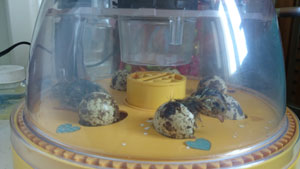Science: Unlocking Potential
Dr Caroline Oprandi Keeping you up to date with science and technology at PACA
We are very excited that some of the quail eggs have hatched. We now have three baby chicks and they are causing quite a stir with students and staff alike. The year 8s have been busy weighing the eggs and plotting graphs, watching the weight go down as the eggs developed. We are now thinking maybe of having a fluffy pet corner. Exeter University launched its own micropig room earlier in May, while Bristol and Leicester universities have drafted in puppies in order to de-stress students prior to exams. 
We have lots of exciting projects underway at the STEM centre and more planned for next year. It is fantastic to see that the novel education techniques that we are introducing here at PACA have been endorsed by the Royal Society. The following article written by Professor Julian Williams and colleagues, from Manchester University, is available on the Royal Society’s website: ‘Re-envisaging STEM education: curriculum, assessment and integrated interdisciplinary studies’. Here is an extract from the Executive Summary:
“The school curriculum and its assessment are ultimately determined by politics, but the debate can sometimes be informed by educational research, and evidence-based argument. This report draws on a literature review to inform a vision for reform of the school science and mathematics curriculum, one that would likely take 20 years.
The key, central strategy is to engage or re-engage children and youth in science and mathematics in ways that are (i) authentic and (ii) interesting and meaningful to the learners themselves. The literature shows above all that the system is failing in this regard today: the curriculum and its assessment are dull, encourage teaching narrowly to low-level fact-based tests, fail to encourage creativity, and switch the majority of learners off. Research has repeatedly shown, however, that learners and teachers can be excited by science and mathematics activity involving creativity, problem solving, modelling, and interest-led projects.
Any vision for reform needs to find ways to implement such activities across the system. We therefore argue for a reform of the curriculum, assessment, teaching and learning to re-focus on learners’ interests, needs, and attitudes, rather than their grades, marks and league table positions. We suggest, for instance, that every student should be entitled to leave school with a portfolio of evidence of activity in STEM that demonstrates who they are, what they are interested in, and what they can do.”
Thank you for this article Julian but why wait 20 years? At PACA we are already doing this; although admittedly just waiting for government and employers to catch up. We are leading the way in reform from the frontline!




















